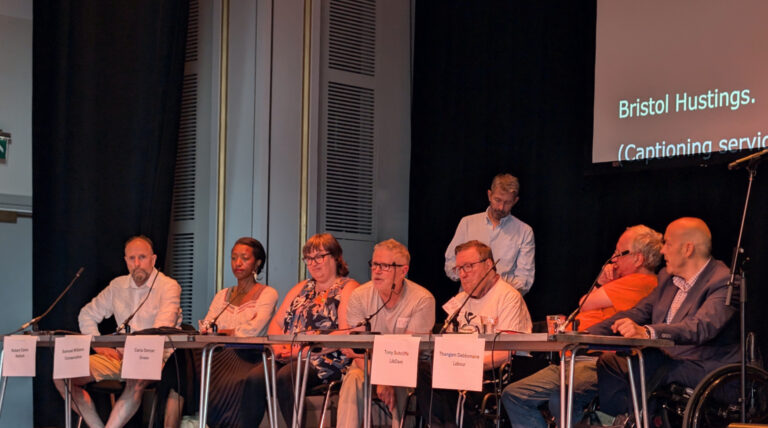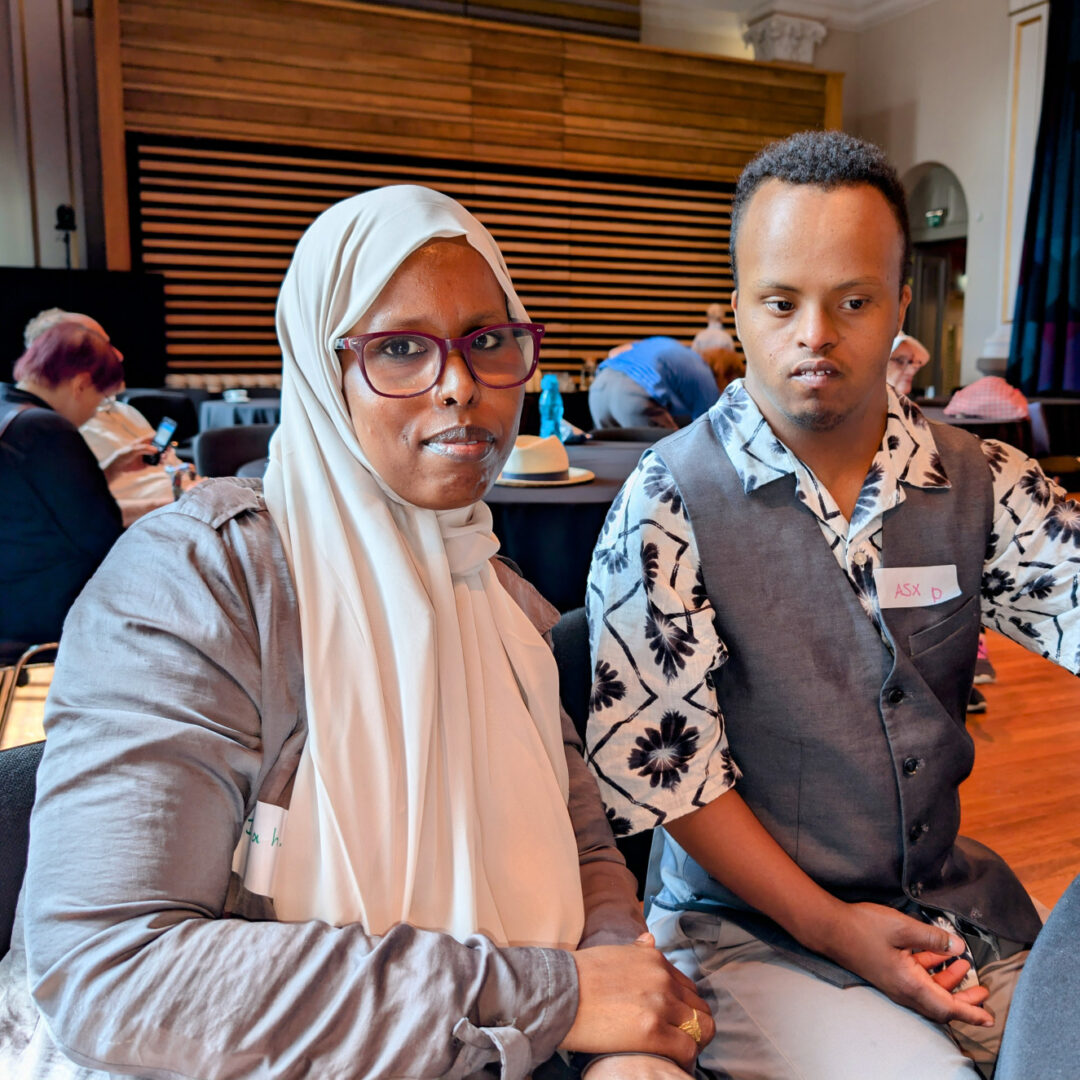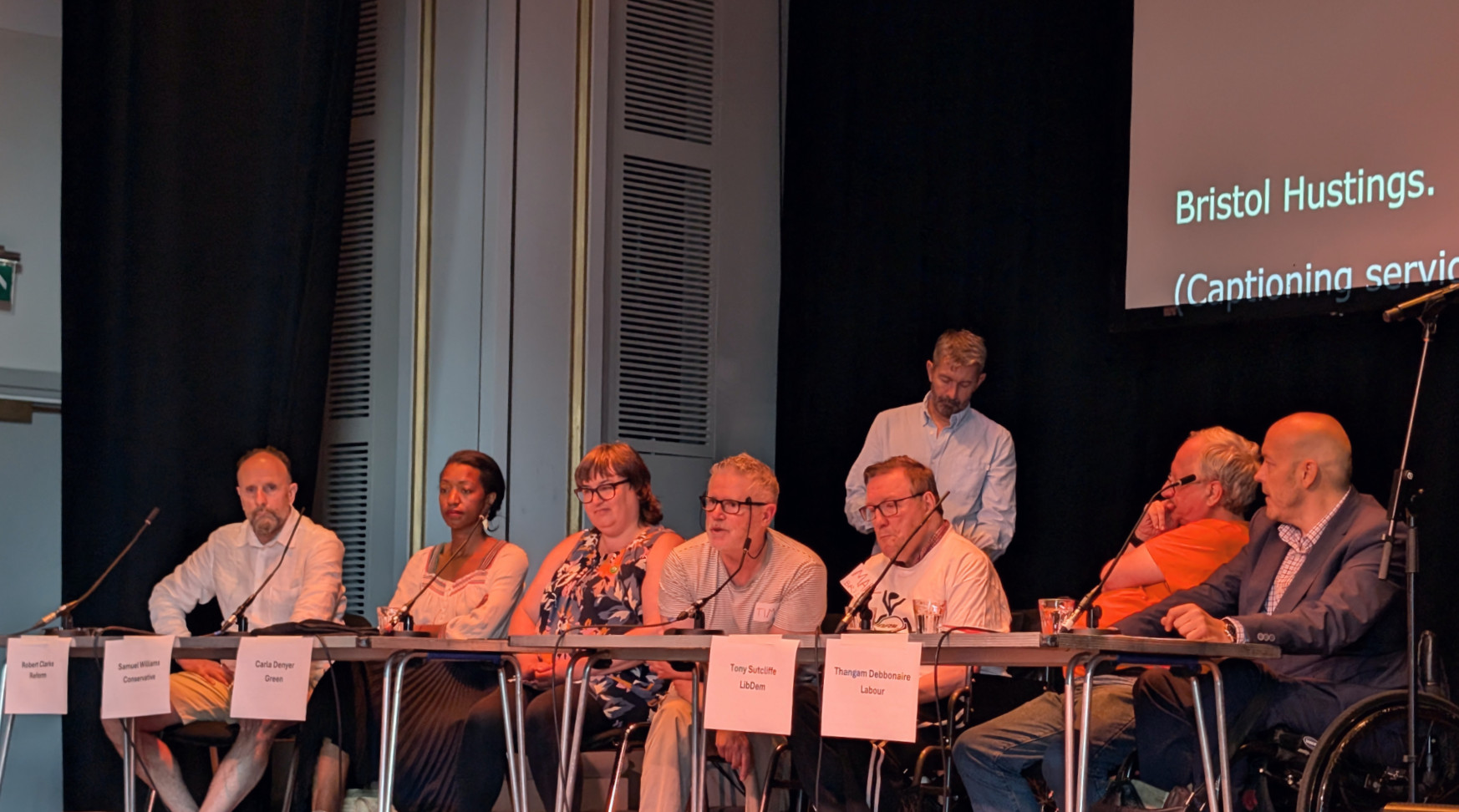

Candidates for Bristol Council struggled this week with tough questions about how their parties would improve policy, benefits and access for disabled people in the city.
Independent living, accessible housing and human rights were the focus of a deaf and disabled people’s campaign event at the Bristol Beacon’s Lantern Hall ahead of the general election on Tuesday 25 June. The event was organised by campaigning organisations Bristol Restoring Independent Living (BRIL) and the West of England Centre for Independent Living (WECIL).

We cover the news that matters to you. Only with your support.
Join now
The event saw controversial comments made by Reform Party candidate for Bristol Central, Robert Clark, who, rather than answering questions directly, used the platform to make unfounded claims about the dangers of vaccinations.
Other attendees, some of whom arrived later, were a mish-mash of Bristol constituency candidates, as well as non-candidates. As is the case in many city campaigns, Bristol Central Labour MP Thangam Devonair sent a letter of apology, and Hillfields MP and former WECIL chairman Kelvin Blake represented her.
Meanwhile, Rose Hulse, the Conservative candidate for Bristol North East, and Jay Breitnauer, the Green Party candidate for Bristol South, spoke on behalf of their parties’ Bristol Central candidates Samuel Williams and Carla Denier, while Tony Sutcliffe, the Liberal Democrat candidate standing for Bristol East in the next election, also joined the panel.
Clark’s desire for attention was immediately noticeable. He claimed an altercation occurred when he entered the event, involving “security and two police officers.” “If you are going to be inclusive, you should not exclude a candidate for parliament in this constituency at the door,” he said.
Later in the event, a further row broke out between two women, with one claiming that reform supporters were there to spread “fascist propaganda”. Onstage, Clarke claimed that “1.5 million people have been injured by vaccinations”, appearing to link vaccinations to autism.
His comments distracted from the campaign’s focus, which included questions from people with disabilities and their caregivers who want to know what the next administration will do to improve their lives.
Ahead of the event, Mark Williams, founder of BRIL and campaign organizer, explained why these questions need to be answered: “It feels like the disability movement has gone backwards in recent years,” he told The Cable.
Concerns about independent living
Responding to a question about independent living, Jay Breitnauer argued that the Greens are “the only party that has a complete costing plan for improving adult social care.”
The party proposes a “wealth tax” on households with assets over £10 million, to fund it, and wants to spend an extra £50 billion a year on health and social care by 2030, including an extra £20 billion a year on social care, including free personal care to help people live independently.
Labour leader Kelvin Blake also answered the same question, saying a Labour government would change the law to put more emphasis on independent living, so that when considering independence for disabled people, the default is always for them to remain “at home”.
As Disability News Service pointed out, this was one of several moments where the panellists went beyond what was in the manifesto: Labour only said that the party would “support people to live independently for as long as possible”.
Housing came up repeatedly, with a focus on how the next administration will ensure independence for people with disabilities, with all candidates agreeing that more accessible housing is needed.
 Ifrah and Suihaib campaigning for deaf and disabled people (Photo by Steph Cullen)
Ifrah and Suihaib campaigning for deaf and disabled people (Photo by Steph Cullen)
Tony Sutcliffe said a Liberal Democrat government would be “focused on devolution” and ensure that homes needed by disabled people and local people are built in areas where they are needed.
Among the audience were Ifrah and Suihaib. Ifrah is a full-time carer for her brother Suihaib, and campaigned because she wanted to hear promises on improved housing and NHS waiting times. Ifrah told The Cable that she, Suihaib and their two children have been living in temporary accommodation in Lockleys for over a year, and that the city council has asked her to accept a property in another area that they know will not meet Suihaib’s needs.
“Suihaib needs his own place but no one is helping us other than telling us to move out of the neighbourhood,” said Ifrah, who is Somali-born and said Suihaib, who was born in the UK, has also been waiting more than 12 months for an NHS appointment. “I want to know who I can vote for to make a difference.”
UN recommendations cause a stir
Applause erupted when an audience member asked how the new government would address a recent United Nations (UN) finding that the UK had “not made significant progress” on violating the UN Convention on the Rights of Persons with Disabilities (UNCRPD). The UN report called for action on a number of issues, including welfare reform, hate crime laws and workforce shortages in disability and mental health services.
Reform’s Robert Clarke avoided answering the question by saying “the UN is doing something bad” and the conference chair, WECIL’s Alex Johnston, was forced to steer the discussion back to disability. Kelvin Blake and Tony Sutcliffe admitted they could not immediately think of any UN proposals and had to look up the UN recommendations on their mobile phones.
Conservative MP Rose Hulse, contrary to her party’s position, enthusiastically supported the UN’s recommendations and even went so far as to say they should be enshrined in law.
As the event drew to a close, another pertinent question was posed about disability benefits. The current system includes benefits such as Personal Independence Payment (PIP) which are intended to help with the additional living costs incurred by disabled people, but they are notoriously difficult to access, with disabled people complaining about an unfair assessment process.
“People are waiting too long for too little money,” said Tony Sutcliffe, noting that more than half of benefit applicants are turned down at first glance and must endure a arduous appeals process. He called the current system and the “work” disabled people have to do to qualify “deeply unpleasant.”
Jay Breitnauer also acknowledged the importance of the issue, as did Kelvin Blake, saying “Labour has plans to overhaul the welfare system to ensure disabled people are treated better.” He admitted he didn’t know what that would look like, as the party’s manifesto was vague on the issue, but said he would continue to lobby for disabled people locally.
Independent. Investigative. Essential.
Investigative journalism strengthens democracy. It’s a necessity, not a luxury.
The Cable is Bristol’s independent investigative news organisation – owned and run by over 2,500 members, producing award-winning journalism that delves deep into what’s going on in Bristol.
We’re on a mission to become a sustainable organization and our first goal is to increase membership revenue by 50% within 12 months. Will you help us get there?
Join Cable Now
Source link

